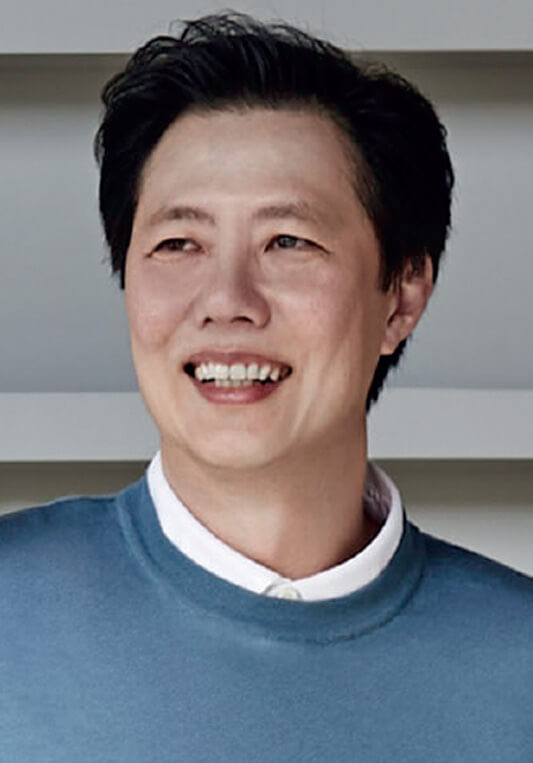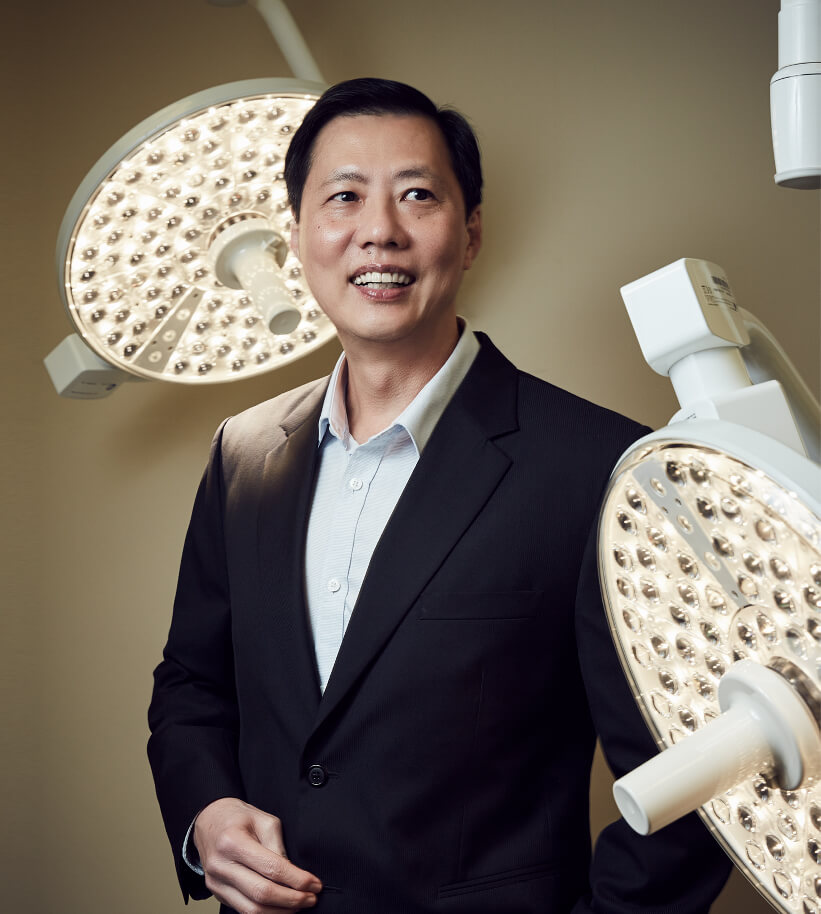
Life is a journey, and those with a positive outlook will enjoy the process more. Two individuals can have the same story – same disease, same outcome – but the one who is positive will have a different journey from the one who is not.
He was a young boy all set on pursuing a career in electrical engineering. But, at the age of 14, Professor Christopher Goh received a book award for doing well in mathematics. The engrossing tale of how Sir Alexander Fleming discovered penicillin captured his imagination and planted within him a deep interest in medical science. This changed the course of his life for good. In junior college, it was the medical stream that he chose to enrol in.
Now a highly regarded ear, nose, throat (ENT) surgeon with more than 20 years of experience, on top of his practice in Mount Elizabeth Novena Hospital, Christopher is also a Visiting Consultant at the Singapore General Hospital (SGH) and National Cancer Centre Singapore.
In his line of work, the hours can be long, especially when 12 to 14-hour surgeries are involved. But it’s worth it, Christopher reflects, when he sees his patients get better. “The joy I see in patients who have recovered well keeps me going. It encourages me to carry on and do my best for the next patient as well,” he says.
Indeed, the patients are what have kept him going all these years. For him, the time he spends with each patient is a journey that he walks with them. It’s not just the treatment for the disease that is crucial but also things like emotional support. He says: “At the end of the day, doctoring is about getting patients well in a holistic way. This means that the communication is just as important.”
And it’s not just the patient that he’s referring to. For Christopher, it’s equally necessary to keep the patient’s family, caregivers and support group informed. He rationalises: “People who worry about the patient also need to be given some information. The patient is asleep during the surgery so they don’t know what is going on, but you can imagine the anxiety of the family members waiting outside. Some of our surgeries take so long they’ll be wondering what is happening. They just want to hear some updates, and know that the surgery is going well.”
This was a key takeaway Life is a journey, and those with a positive outlook will enjoy the process more. Two individuals can have the same story – same disease, same outcome – but the one who is positive will have a different journey from the one who is not. from his time spent with one of his mentors, Professor Patrick Gullane, a worldrenowned ENT-Head & Neck Surgeon. During his one-year fellowship in Toronto, Canada, under the SGH Scholarship, Christopher observed that Prof Gullane always took pains to talk with and explain things to his patients, and he made the effort to seek out the patients’ support groups as well, no matter how exhausted he was after a major surgery.
This left an impression on Christopher and he went on to adopt it himself. “I find that to be good practice,” he says. “Like I said, this is holistic care. You need to be good at what you do and get the patient well, but this is the other aspect of it.”
The challenge of working with cancer is that there will always be individuals who don’t make it even with treatment. Christopher tries to take this with a stoic stance. “With cancer patients, you don’t always win. Thankfully, the majority of my patients actually do well. But you cannot cure everything,” he points out. “I take it as a journey I accompany them on. Although they may not be cured from the disease, they get some relief and emotional support, and I feel satisfied that I have done my best for them, and was a positive impact in their lives.”
Expounding on the importance of holistic care, Christopher brings up a quote by Edward Livingston, the American jurist and statesman: “To cure sometimes, to relieve often, to comfort always.”
“The thrust of a doctor’s work is to do the best for his patient. But how do you define ‘best’?” he muses. While the objective is always first and foremost to cure the patient, it is not possible to pursue a cure at all costs, but comfort and relief can always be provided.
After all, length of life is something that no one can be sure about, he reasons. “It doesn’t mean that if you don’t have cancer, you won’t suddenly collapse or get hit by a bus. But with patients, you must give them some indication of hope and a positive reason to live for,” he explains.
Optimism is one of the keys to recovery. He says: “Life is a journey, and those with a positive outlook will enjoy the process more. Two individuals can have the same story – same disease, same outcome – but the one who is positive will have a different journey from the one who is not.”
That said, Christopher is always gunning for the win. He recalls the case of a 15-year old girl who had cancer of the parotid (salivary) gland. The diagnosis was a huge blow to the teenager, who went into denial and rebelled against surgery and treatment. He worked with the girl’s parents to engage her and eventually, she came around and the surgery proceeded as planned. After the surgery, she continued with radiation treament and after five years of follow-ups, she stopped going to see him.
“It was tough for her,” he recalls. “I always wondered what happened to her.” He found out when she showed up several years later at his head and neck clinic with three children, the youngest of whom was six months. “She brought them all to see me, to say hello, and to tell me how grateful she was that she was cured of cancer and doing well with three children.”
“That’s one patient I always remember.” He reflects: “These are the things that are a great source of encouragement, and which makes the hard work worthwhile.”
Apart from his practice, teaching is something that Christopher is passionate about. His numerous roles include Adjunct Professor at the Duke-NUS Graduate Medical School and past Chairman of the Residency Advisory Committee of the Ministry of Health, which oversees the training of residents in Singapore. On top of these, he takes the time to help train surgeons in developing countries.
He says: “It’s not just about going overseas for a mission trip and to help perform the surgery. The point is in being able to reach out. By teaching surgical techniques, the effort is multipled and you can help an even bigger group of people.”
Christopher is also the current Chief Commissioner of the St John’s Ambulance Brigade, where he contributes by doing things like teaching first aid to students. This is a role he avidly enjoys. “It’s important to help develop the next generation. These young people are the ones who will be looking after us as doctors or in other professions. And St John’s is a humanitarian organisation, so it’s also a chance to give back to society.”
He adds: “Helping to train the next generation is the biggest contribution I can make to my field.”
Family is important. It’s the core of anyone’s existence. Everything starts with a family. A healthy family life, I think, will make you happier and more productive. It does have an impact on how well you do at work. So I treasure that.
With the free time he has left, Christopher relishes spending time with his wife and three children, two daughters aged 16 and 13, and a son who is 11 years old. To make sure they get to do things as a family, he has even given up golf, which he found too time-consuming.
The activities they choose are typically simple pleasures focused on the great outdoors, as he hopes to inculcate in his children a love and appreciation of nature. Apart from light hiking in places like Sungei Buloh and Pulau Ubin, the five of them often take their foldable bicycles for a ride along the Park Connector Network to destinations like Marina Barrage and Gardens by the Bay.
To Christopher, it’s not a big deal that all of his time is spent on work and family, leaving little for himself. “Family is important,” he reasons. “It’s the core of anyone’s existence. Everything starts with a family. A healthy family life, I think, will make you happier and more productive. It does have an impact on how well you do at work. So I treasure that.”
Professor Christopher Goh is an advocate of sensible lifestyle choices, such as avoiding known carcinogens and cancer-causing activities like smoking, drinking and betel nut chewing. Apart from that, individuals should look out for persistent signs and symptoms that may indicate a more serious problem.

Senior Consultant Thyroid-Head & Neck Surgeon
MBBS (Singapore), FRCS (Edinburgh),
FRCS (Glasgow), FAMS (ORL)
Prof Goh is a Senior Consultant ENT specialist in Singapore with over 20 years’ experience, both locally and abroad in the UK and Canada under the Health Manpower Development Programme Award and the Singapore General Hospital (SGH) Scholarship.
A respected figure in his field, Prof Goh was the Head of the ENT Department at SGH and a founding member of the Asian Society of Head & Neck Oncology. Passionate about training up future ENT doctors, he teaches at the Duke-NUS Medical School and serves as Chairman on the Residency Advisory Committee at the Ministry of Health. A recipient of numerous service awards, Prof Goh’s dedication to his patients and the advancement of his field cannot be overstated.